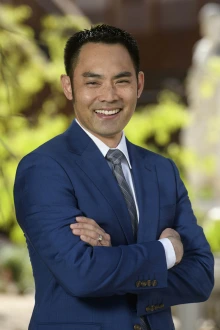Dr. David Tzou Recognized with Health Sciences Career Development Award
The University of Arizona Health Sciences Career Development Awards (CDA) program recently selected David Tzou, MD, assistant professor of urology at the College of Medicine – Tucson, as one of its four 2021 recipients.
“I am honored to be the first from our Urology Department to receive this award. Hopefully this can pave the way for future urology CDA recipients,” Dr. Tzou said. “I feel very fortunate to have a tremendous mentoring team to support me, and I’m hopeful we can make a breakthrough in understanding why certain patients with kidney stones develop sepsis after surgical treatment. Stone endotoxins are our most promising lead, but to date, we do not really understand why some patients get so sick following surgery.”

David Tzou, MD
Dr. Tzou’s previous research has focused on minimizing radiation in kidney stone patients and using ultrasound to guide surgeries for kidney stones and enlarged prostates. He has also been integral in building the Registry for Stones of the Kidney and Ureter, a multi-institutional NIH-funded effort that includes the University of Arizona Health Sciences Biorepository, where urine and kidney stones are housed for future study. A Tucson native, Dr. Tzou earned his medical degree at the College of Medicine – Tucson, where he also completed his internship in general surgery and residency in urologic surgery.
Kidney stones are increasing in incidence and the mortality associated with this disease is on the rise. Patients recovering from kidney stone surgery are at risk for severe infections, which sometimes trigger severe inflammatory response syndrome, an amplified immune response that could endanger the patient’s life. Using samples of kidney stones from the registry, Dr. Tzou will test the hypothesis that certain bacteria species associated with kidney stones produce toxins that overstimulate the inflammatory response. They will measure levels of bacterial toxins in patients recovering from kidney stone surgery to learn if certain bacterial species increase risk of severe inflammation.
CDA scholars must complete an independent research project, which is expected to generate sufficient pilot findings to enable the submission of an NIH K-series or R01 grant (or equivalent) by the second year of the program. Each scholar also must choose a lead mentor, or mentors if the project is multidisciplinary.
“Dr. Tzou and I have been collaborating for more than a year now, and it is clear that he has all of the qualities of a promising physician-scientist. He is well-published and has surrounded himself with a network of strong mentors with a track record of diverse federal extramural funding,” said Dr. Tzou’s primary mentor, Gayatri Vedantam, PhD, professor of immunobiology at the College of Medicine – Tucson and of animal and comparative biomedical sciences at the College of Agriculture and Life Sciences. “Since infection-related kidney stones continue to cause significant patient morbidity and mortality, this research is poised to provide a strong return on investment given that so little is known about stone endotoxins.”
The CDA program was established by the Office of the Senior Vice President for Health Sciences in 2014 to provide research training and funding for junior faculty members and foster academic careers in clinical and translational research. Selected scholars are provided with mentorship, research training and salary support, plus funding for travel and research supplies.
The other junior faculty members who were selected for this latest round of awards will be profiled in the coming weeks:
• Chris Lim, PhD, assistant professor of community, environment and policy, Mel and Enid Zuckerman College of Public Health;
• Andreia Chignalia, PharmD, PhD, research assistant professor of anesthesiology, College of Medicine – Tucson;
• Amanda Wilson, PhD, MS, assistant professor of community, environment and policy, Mel and Enid Zuckerman College of Public Health

